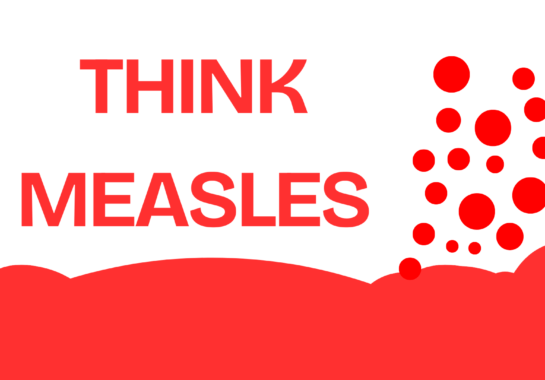We have recently seen an increase in children attending the hospital with measles, which is a highly infectious disease.
What should you do if you think you or your child has measles?
Don’t attend A&E with measles unless you have to
If you think you or your child has measles, the best thing you can do is to stay at home and call NHS 111 for advice.
However, if you need to attend Alder Hey, please inform our staff as soon as you arrive.
What is measles?
Measles is a highly contagious infectious viral disease, which can lead to serious illness, hospitalisation, and in some cases even death.
Measles is one of the most infectious diseases on the planet. One person with measles can infect up to 15 other people. If you’re unvaccinated, you have a 90% chance of catching it from someone who is infected.
How can I get protected against measles?
Getting vaccinated is easy. Two doses of the MMR vaccine will give you lifelong protection against measles, as well as mumps and rubella. Children and young people can be vulnerable, so it’s important to get both yourself and your children vaccinated. It’s easy to get the MMR vaccine, as it is available at your GP. If you’re unsure whether you’re covered, contact your GP today to help protect children and young people.
Click here to access our Symptom Checker Alder Hey’s Open Letter about measles Video of Rachel Isba about the increase in measles cases (Facebook) Video of Chief Nurse Nathan Askew about the importance of a MMR vaccine (Facebook)Message for primary care about measles
Common myths about measles
Myth: Measles is a mild disease
Measles is commonly not a mild disease. We know that children are more likely to be admitted to the hospital with measles than with chickenpox.
However, if you need to attend Alder Hey and suspect that you or your child has measles, please alert a staff member as soon as you arrive.
This will allow staff to make sure you and your child are isolated from vulnerable children, while still receiving the care your child needs.
Myth: The MMR vaccine causes autism
The MMR vaccine does not cause autism. This has been extensively researched over decades, including looking at autism rates through periods of introducing and withdrawing the vaccine.
Myth: Natural immunity to measles is better
Measles wipes out a large chunk of your immune system. This means that both you or your child are more vulnerable to infection in the years to come.
Myth: The MMR vaccine is not halal
A halal MMR vaccine is available, and if this is something you need, speak to your GP for more information.
If you need any additional information about measles, you can read more on our Symptom Checker.
